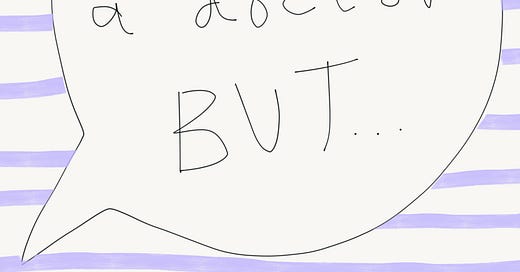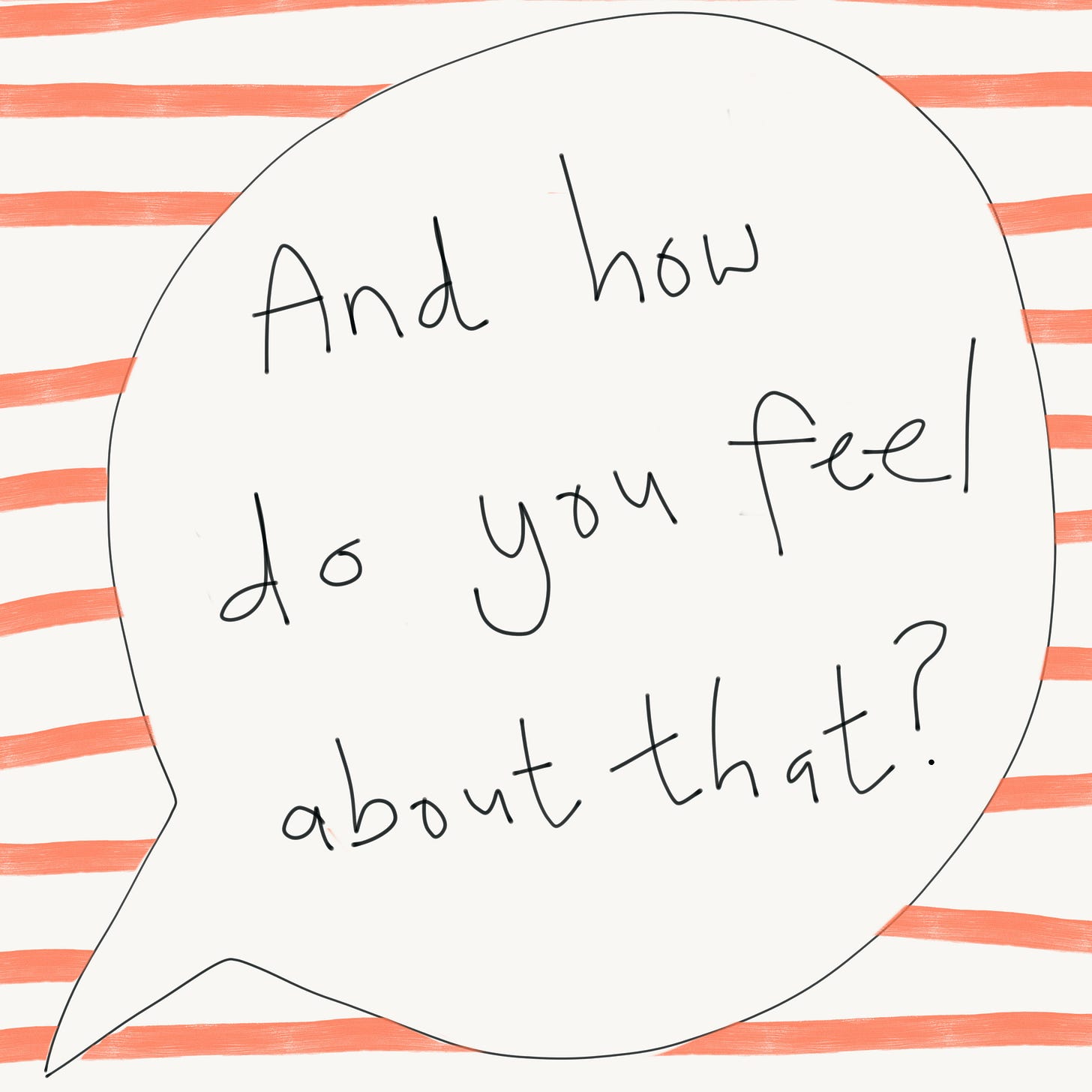"But You Don't Look Autistic!" - the Best and Worst Reactions to Disclosing My Diagnosis
Um, Autistic people look like people, pal.
Since my slightly s h o c k i n g (to me, at least) Autism diagnosis in December I’ve disclosed my diagnosis to quite a few people. I told my partner and all my closest friends straight away.
I told my very likely neurodivergent mum pretty quickly too. I took a couple of weeks getting used to the diagnosis before I told my almost certainly Autistic dad.
The people I told immediately responded the way I expected/hoped. Telling them felt good. Like I was letting them in on who I really am, and they felt honored to be trusted. They allowed me to lead the conversation, and asked sensitive questions, like How do you feel about that?
Unfortunately, reactions to my diagnosis outside of my inner circle have not all been so affirming. Here’s the best and worst of the responses, not so we can judge and shame people, but in the spirit of learning and helping people do better.
The Worst Reactions
The clever family friend:
“We all have certain traits to a greater or lesser extent. Maybe I could be deemed autistic.“
How it made me feel:
Confused, questioning my diagnosis, wondering if I’d just wasted £700, wondering what was wrong with me that I was going around trying to force people - literally paying them hundreds - to admit there was something wrong with me, wondering if I should have just tried harder, wondering if I had taken a wrong turn. Wondering if I was mad.
On reflection, this person may have been talking about the neurodivegency movement, and how it is insisting that there is any kind of normal or optimal brain that is actually the problem in this world of ours. So maybe we agreed.
I’m still confused about this.
How I acted:
Curious, calm, capable.
How I wish I’d acted:
Not allowed and engaged in dissecting the integrity of my diagnosis. Pointed out that this was my life we were discussing, and that the diagnosis was incredibly hardwon and expensive, and that it had given me a lot of inner peace.
Changed the subject (really need to learn how to do this.)
The friendly nurse:
“I don't think you are autistic, you are too emotionally open. You've already told me about emotional neglect (that’s what you get for asking someone what they are reading on their Kindle, lady), that your dad just died and that you're autistic.”
How this made me feel:
Annoyed that nobody understands the breadth of autism, and like I need to go home and write a newsletter about it. Also like she was contradicting herself as her evidence for me not being Autistic was actually a total lack of boundaries, which I think is a pretty classically Autistic thing.
How I acted:
Curious, calm, capable. Amused.
How I wish I had reacted:
Pointed out that people have lots of misconceptions about female autism, and that she should read up on it if she was interested. (This sounds rude, perhaps?)
The lovely and well-meaning acquaintance:
“I don’t think you’re autistic, you probably just missed out on some of the developmental bits you needed growing up.”
How this made me feel:
Confused and unheard. I had literally just told her the news that I had received a diagnosis from a senior clinical psychiatrist. I didn’t really know how to respond to this.
How I acted:
Curious, calm, capable. Are you seeing a pattern?
How I wish I had reacted:
Amused, and reminded her I just got a diagnosis from a professional.
The Best Reactions
The probably equally autistic colleague:
“Congratulations!”
How this made me feel:
Seen, heard and understood. Learning that there was a reason why life had been so difficult was incredibly validating. A bit like when you finally collapse of an illness nobody believed you had. Like Spike Milligan’s wonderful gravestone "Duirt mé leat go raibh mé breoite" - I told you I was ill.
Also, it made me laugh, which is always a bonus.
The sensitive friend:
“And how do you feel about it?”
How this made me feel:
This is a question I have dearly come to love, and I use it myself a lot. It is appropriate in many contexts, and also it helps give you a clue about how to pitch your next response.
I only learned the power of this question a few years ago from my friends in the caring profession. It felt uncomfortable at first when they asked me this like we were in a therapy session. But it felt nice too, like me and my issues were worthy of their full attention. I noticed that other people seemed to like it, too. Also, it gives you a sort of conversational map to follow, which is v. helpful.
What I have learned to improve things going forward
Some people think labeling is negative and stigmatizing, but finding out I am Autistic has felt incredibly positive. I know where to look for the help I need now. And I know that it isn’t just a case of needing to push myself more or try harder. I know there are other people who have similar struggles to me, and that makes all the difference.
Self-knowledge is essential if we are going to create a life that suits us.
My Autism diagnosis helps me understand my struggle with executive functioning, relationships, social communications, groups, getting overwhelmed and overstimulated easily and high social anxiety. It allows me to make better decisions about how to use my limited energy.
The truth is that I process events and emotions slowly. It sometimes takes me two days to notice someone was mean to me or made me feel small. This means that I rarely manage to let my friends know they have hurt or annoyed me in the moment. I am also very afraid of conflict and so letting friends know they have hurt or annoyed me under any circumstances and on any timeline seems terrifying.
But I am trying to find workarounds. I am the queen of the follow-up text. Because late clear communication is better than no clear communication.
If I sound like a wuss then that’s because I am. Raised voices scare me. Silence scares me. Conflict makes me want to die. I am working on assertiveness, but who knows how far I’ll ever get (she whispers, assertively.) I’m already 37!
Also, when I say I am working on assertiveness I’m lying, because I haven’t got time. I’m working really hard just trying to get by.
And since I’m already working overtime to not even really keep up, maybe other people could stop offering their opinions so readily. Maybe I don’t need to be more assertive at all.
It’s certainly possible that the tentative (and vastly unassertive) way I deliver information invites people to offer their opinion. Or maybe people feel more comfortable telling it how it is to diminutive femme presenting humans with a tendency to pour their hearts out. #thepatriarchy
There’s certainly an argument to be made here for not disclosing your diagnosis without consideration, but that isn’t the takeaway I intended. I like telling people my diagnosis, because I like telling the truth. It’s simpler for me to lay everything out than to choose what is and isn’t appropriate.
The key thing is to surround yourself with kind people who have your best interests at heart. As you do this, you can gradually let go of the mask.
As you can see from my examples, my most common way of masking is to act more calm, comfortable and capable than I feel, nearly all the time. It usually takes about 2 days before I realize how I actually felt about something. I’m really working on this, and the situation is getting better. Maybe my reaction times will get quicker. Or maybe I will just continue to be the Queen of the On reflection… text.
All of the people who are included on this list fall into the camp of Good Eggs. Even the nurse who I didn’t know at all. (Before I left I tasked her with thinking up the ending of my novel, too, just in case I hadn’t been inappropriate enough.) And I know that none of them wanted to hurt me.
My alarmingly successful masking means that I can accidentally lure people into upsetting me, because I seem so calm, comfortable and capable. This means people can then be pretty surprised when later I reveal the news that the happy me they last saw was actually really wounded.
The fun is never-ending!
And this is why I prefer to write.
Thanks for reading, please share widely and subscribe. Help me to spread awareness and let’s support each other to drop the masks.
Chelsey x
So how about you? What are the most unhelpful things your friends, family and frenemies have said? What are the most helpful? What do you say when you hear a friend or colleague is Autistic? How do you wish people would react?








Loved it, obviously identify so hard. I have no idea how to be anything but calm confident and capable in most situations too, I wrote about it in my PD group essay (though I used a defense mechanism theory to fit it into psychodynamic academic thinking).
It's hard pushing back on people's reactions. I also feel so unprepared and have no idea what to say. Lots of people I have told have immediately started asking me what the symptoms are... and it's just so hard to articulate it on the spot without it sounding like 'stuff everyone does sometimes' (or maybe that's just the fear I have of what is about to come) so I either end up floundering or say its too complicated or that 'it's a brain & memory problem and ironically that makes it hard for me to explain.'
But I soooooo want to explain. Because what I secretly desperately want is for someone to go 'oh yeah you obviously have all those things, that's so you'. And some people even have. You have. My boyfriend has. Mum. Lifetime best friends. All the people that really really know me. It's weird sort of wishing your 'ailment' was worse/more visible. I'm sure it's better that it's not really.
But feck me did I go through a lot of shame based emotional pain post diagnosis because I didn't think I deserved the label of adhd and I was so scared of people rejecting me and my decisions around it (ironically linked to rejection sensitivity dysphoria, which is a common adhd symptom).
So bloody grateful I have people like you, so that I know that I'm not just totally delusional!
Incredibly helpful explanations for people like me who aren't burdened but may not recognise those who are and as a consequence respond, unintentionally, unthinkingly and unsympathetically. Ignorance is not bliss for anyone.